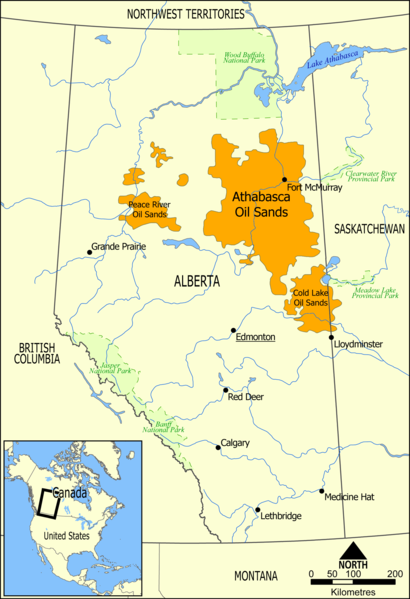Key words :
climate change,
tar
,climate change
,future energies
,greenhouse gas
,oil refineries
,émission
,canada
,environment
Midwest Oil Refineries Gobble Up Canadian Tar Sands, Spew Greenhouse Gasses
14 Feb, 2008 12:07 pm
Midwest oil refineries are gobbling up more and more crude oil from Canadian tar sands and are set to belch out up to 40 percent more greenhouse gas emissions in the next decade.
Canada has huge reserves of tar-soaked clay and sand known as "tar sands" lying under the swampy forests of northern Alberta. At today's higher oil prices, these tar sands are seen as a profitable and reliable source of oil but they require environmentally devastating mining processes and vast amounts of energy to extract. The resulting heavy crude oil requires also more energy to process at refineries. Researchers have calculated that refining the Canadian tar sands crude produces 15 percent to 40 percent more carbon dioxide emissions than conventional oil, the Tribune reports. (Editors note: I believe this does not include "upstream" emissions resulting from the energy intensive mining processes.)
As the Tribune points out, with no greenhouse-gas regulations currently in place, oil companies face no costs for the extra pollution they will churn into the atmosphere.
"This is a glaring example of how our energy policy and climate policy are at cross purposes," said Judi Greenwald, director of innovative solutions at the Pew Center on Global Climate Change. "Companies are making decisions that really don't make sense on a national level when you fail to take climate change into account."
 Increasing
reliance on environmentally destructive and carbon-intensive tar sands
is a very worrying trend and presents a glaring inconsistency as
Midwestern governors, leading presidential candidates and the US
Congress all work on policies that will help drive greenhouse gas
emissions reductions.
Increasing
reliance on environmentally destructive and carbon-intensive tar sands
is a very worrying trend and presents a glaring inconsistency as
Midwestern governors, leading presidential candidates and the US
Congress all work on policies that will help drive greenhouse gas
emissions reductions. "If carbon isn't considered in these huge investments, we are going to be stuck with a tremendous burden," said Henry Henderson, a former Chicago environment commissioner who now heads the Natural Resources Defense Council's Midwest office.
Like coal-to-liquids synthetic fuels, this un-conventional source of fuel may help reduce reliance on Middle Eastern oil, but only exacerbates global warming. Comprehensive global warming regulations are needed quickly so that decisions about alternative fuels incorporate both concerns about energy independence AND global warming and do not simply trade one huge problem - our oil addiction - for another - accelerating climate change.
Read more at the Chicago Tribune.
Originally published on: Watthead
Key words :







Still, a somewhat larger and rapidly growing share of CO2 is emitted worldwide through generation of electricity from coal. The popular rumor is that China is building a new power plant based on burning coal every week.
Eventually there will be a shortage of liquid fuels needed for construction, etc., even if we conserve strongly in the transportation area. This is due to the peaking of oil and rapid production decline which will occur within the next decade.
If we are to make liquid fuels synthetically, using tar sands/heavy oil as the base source, will result in about half the amount of CO2 being emitted overall, than would be emitted if coal is used as the base source (CTL). It's not correct to lump the two together.
Still, I would be in favor of a moratorium on new tar sands or heavy oil developent until we learn to stop wasting so much of the conventional oil resources.
The best way, IMO to do this would be by instituting a worldwide carbon tax,. The funds could be used in a UN program to reduce poverty in the third world, one comoponent of which would to encourage family planning and limit family size.
Biofuels would also be subject to this tax, so they don't get the "free ride" they are getting now.
For those countries who refuse to cooperate with the carbon tax, it could be could be collected via imposition of tariffs on finished goods exported from that country. It's pretty easy to calculate that number.
What's the point of limiting CO2 now if we cannot limit the number of people who, to some degree will dependent on it in the future?